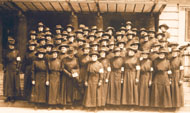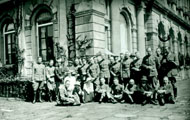In Her Words
Letter from Julia C. Stimson to her family, June 6, 1917
Rev. Henry A. Stimson, father of Base Hospital 21 chief nurse Julia C. Stimson, compiled his daughter’s letters to her family during the First World War into the book, Finding Themselves. Published in 1918 (before the end of the war), Finding Themselves tells of the experiences and gradual changes in the nurses as they “found themselves” through days and nights of unrelenting and difficult service.
After members of Base Hospital 21 landed in Liverpool at the end of May 1917, the enlisted men were sent to Blackpool for training. The officers and nurses were sent to London for a two-week conditioning course on the medical tragedies of war. This letter relates Stimson’s experiences in London as well as her impressions of women’s changing roles during wartime.
The following is the first letter from Julia Stimson to her family. The members of Base Hospital 21 left St. Louis on May 17, 1917 and sailed from New York two days later.
Wednesday, June 6, 1917
Dearest Family –
I have not written since that day in Liverpool, and now we have been ten days in London. If only I had the ability to write what we have seen and what we have felt. The contrasts have been so great some of us have almost lost our mental equilibrium. We are f�ted and cheered and taken from one entertainment to another and made much of by people of every class; and then between such social affairs we visit hospitals, military hospitals, because it is necessary for us to see how such hospitals are run. First we see 1700 men, young men with faces or arms or legs blown off, and then we go to a tea at a fancy club; next we see 500 blinded men fighting their way back into normal life by learning various occupations, then we are taken in a body to the silliest musical comedy that was ever staged. Again we see thousands of crippled soldiers brought out to see the King use his left hand to shake hands with one man, because the man’s right arm is gone, and then we go to St. Paul’s and see the Stars and Stripes carried up to the altar with the 64 British flags to be blessed at an “Empire day” service, while thousands and thousands of people sing “O God, our help in ages past.”
Do you wonder that our emotions are wearing us to a frazzle? It is not only feminine emotions that are affected, because there are those of our directors who said they could not go to St. Dunstan’s (the hospital school for blind soldiers) because they would not be able to sleep for nights afterwards. It is a mistake not to see such a wonderful place, however. There never was a more cheerful, hopeful place in the world. Sir Arthur Pearson, the blind man who runs the place and is its inspiration, is doing the kind of reconstructing of lives that probably has no parallel in the world. He is having the men taught not just the trades and occupations that blind men are taught in other places, but all sorts of things. We saw men learning anatomy, who after a year’s most strenuous training will be certificated masseurs. They take the regular examinations that the sighted people take and get excellent marks, and always get positions. There were men learning cobbling and carpentry, and chicken-farming and shorthand and typewriting and matmaking and weaving and basketry. The whole place was full of whistling, singing men who were going about their business as though they were like everybody else in the world instead of in total darkness forever. There were 500 of these men.
People tell me that English men and women have passed the emotional stage and have now settled down to work without the waste of riotous emotions and bursting feelings. It must be so or they would be dead, and they could not be doing the wonderful “war work” that each one of them is engaged in. From the highest to the lowest each woman has her work, her nursing, her preparing vegetables in hospitals (as Mrs. Waldorf Astor’s sister was doing), her making of supplies, her managing a hospital in a private house, her organizing “hostels” for nurses, raising funds, everything that one can conceive of as a job for women is being done, as never before. Of course the street-sweeping by women is a kind of war work, and the bus conductoring, and delivering mail and telegrams, and driving cars and ambulances. The streets are full of women in uniforms of all sorts, all smart and business-like. Women in England are coming into their own. What is to happen after the war when the men come back can well fill the minds of those who are given to prophesy changes, for a change is taking place here that can never be undone. In addition to women taking a new place in the working world, class distinctions are being broken down in a way that is making itself felt to those who a few years ago could never have dreamt that such a change was possible. A few days ago Miss Dunlop and I were lunching with a Lady H. on Carlton House Terrace, overlooking St. James Park. In front of her house is the famous Crimean monument, flanked on one side by the beautiful statue of Florence Nightingale and on the other side by a statue of the father of the husband of our hostess. In the course of the talk at the luncheon, which was most informal and frugal, the conversation turned to the most-talked-of subject at meals nowadays, her “work,” and Mrs. A., who has a thousand-bed hospital on her grounds at C. and who spends almost her entire time in the wards, not nursing but talking and cheering the men up, said the men don’t know it, but they are giving us far more than we are giving them, and Lady H. replied: “Our whole outlook is changing. Take, for instance, us here to-day. A short while ago you (meaning Miss D. and me) and we (meaning Mrs. A., Sir Harry L., the other guest, an elderly man who had recently lost his only son, and herself) would have had nothing in common, and now we have everything in the world.” This was said most simply and sincerely and was what she really felt.
I can’t tell you the number of people who have given us this same impression, and I can’t begin to tell you how they all have tried to express to us what they think about our coming over to help them. Many individuals have talked to us separately with tears in their eyes and the warmest handshakes, and we have had speeches made to us in theaters by actresses and managers, who have led the whole audience in cheers. We have been stopped constantly on the streets by people who have asked us if we were not some of the “American Sisters” and wasn’t there some way in which they could express to us their appreciation of what we had come to do. Could they not take us to their homes and give us tea, and could they not come to our hotel and take us out in groups to sightsee, and could they not send us tickets to this or that, and could they not make special arrangements to have Towers of London, and the Zoological Gardens and Lambeth Palaces and Houses of Parliament and such little things opened for us at unusual hours? We have been literally swamped with kindnesses. One officer has made himself almost a nuisance by giving us theater tickets for every single night and has been so insistent that every single nurse should go out to see something every night that we have come to dread his daily telephone calls or visits. Mrs. Page had a reception for us and Mrs. Whitelaw Reid, and the Archbishop of Canterbury asked us to tea, and we spent a wonderful afternoon at Cliveden, and Sir Thomas Lipton sent us all chocolates and invited some of us to motor out to his place. The Royal Overseas Officers Club gave a reception for us, the American Woman’s Club opened its doors to us. We have been sent choir seats at St. Paul’s for special services and special tickets to the Royal Investiture, and there have been a number of other things which lords and ladies of high degree have asked us to in greater or lesser groups. . . .
Lovingly,
Julia
Next letter from Julia Stimson to her family (June 17, 1917)>>
Return to Letters & Memos (In Her Words)
Return to In Her Words
Back to Top


